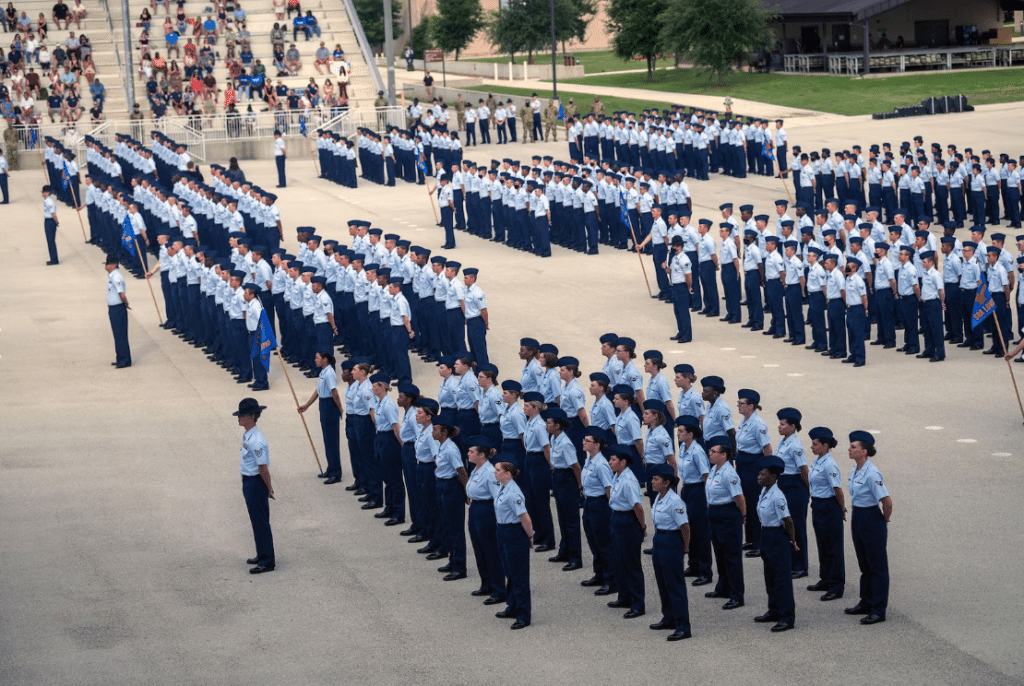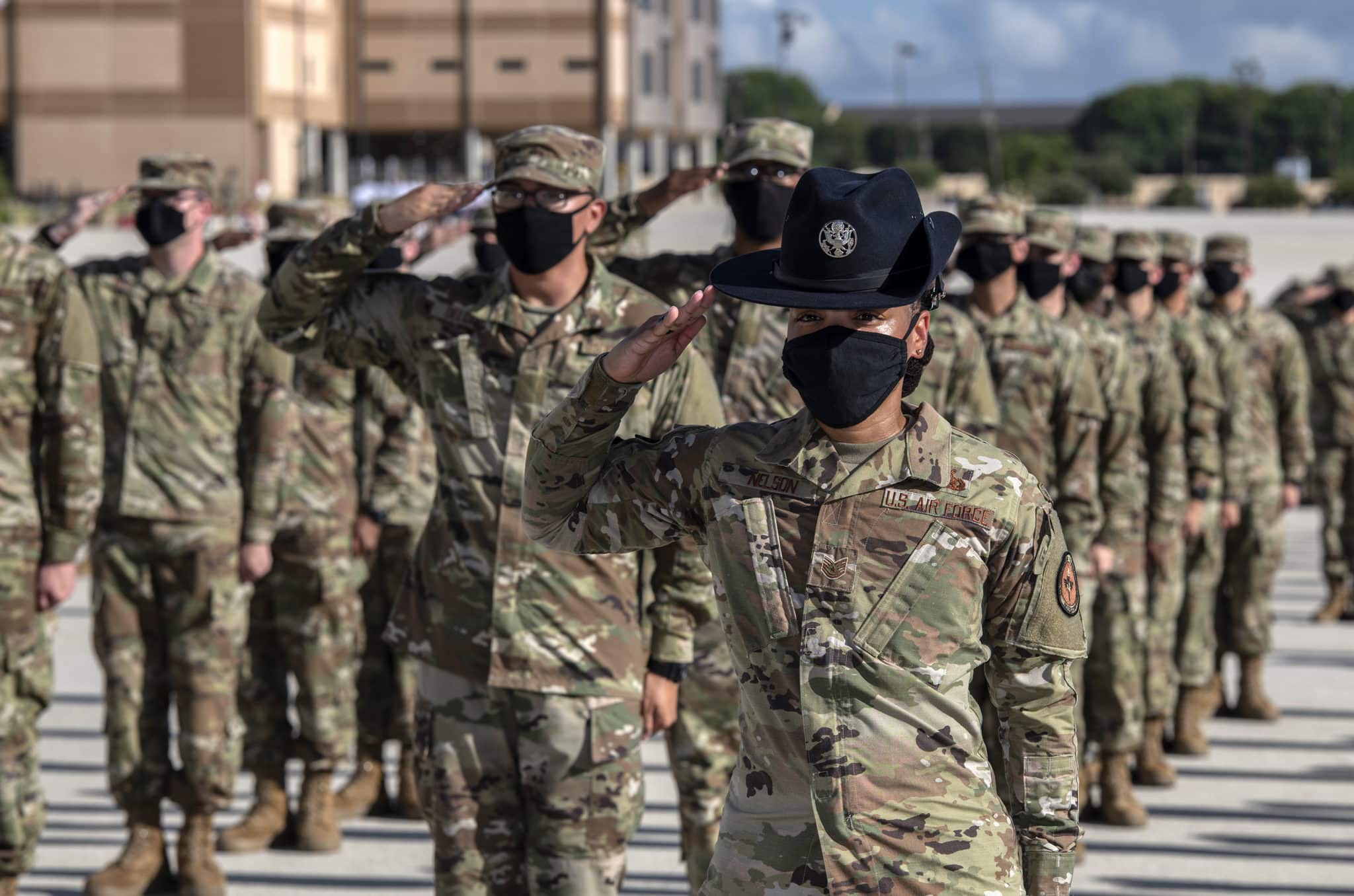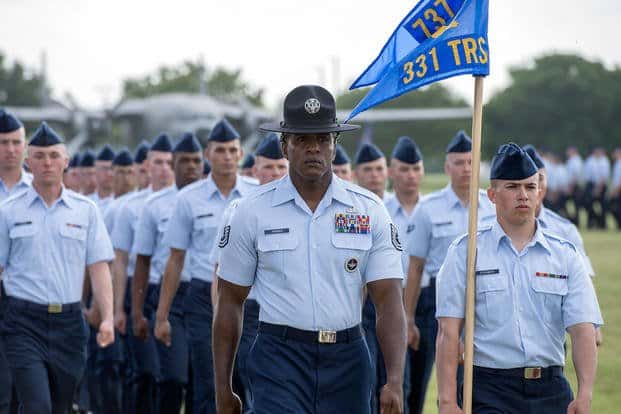Find Out From an MTI (Military Training Instructor)
Is Air Force Basic Training Hard
The short answer to this question is almost surely YES, but it’s all relative. What I mean by that, is that how you perceive the difficulty of your time at basic training will depend on you, your particular strengths and weaknesses, and the set of norms and values you grew up with. For some, Basic will be hard in all of the traditional ways you think of it being hard- lots of PT, getting yelled at all the time, no time to eat, etc.
For others, there are going to be some things about Basic that will end up challenging you in ways that maybe you weren’t prepared for. If you WANT to be aware of what those challenges will be, then read on. A lot of things at Basic will wear on you over time, but part of meeting the challenge will be going in armed with the correct information and the right mindset.
How Hard is Air Force Basic Training
I couldn’t possibly list out all of the different factors that could affect trainees and cause them stress. Below are just some of the more common things I noticed while I was an instructor. I’ve grouped the various stresses into broad categories of physical stress, social/emotional stress, and mental stress. Again, part of preparing for USAF Basic Training is being aware of the challenges you’ll face going in. Off we go.
Physical Stress at BMT Air Force
You probably expect to be stressed about PT workouts, but there are other physical stressors at BMT as well. And while meals and sleep should help you deal with those physical stressors, they can themselves become sources of physical stress if not approached the right way.
PT or Physical Training
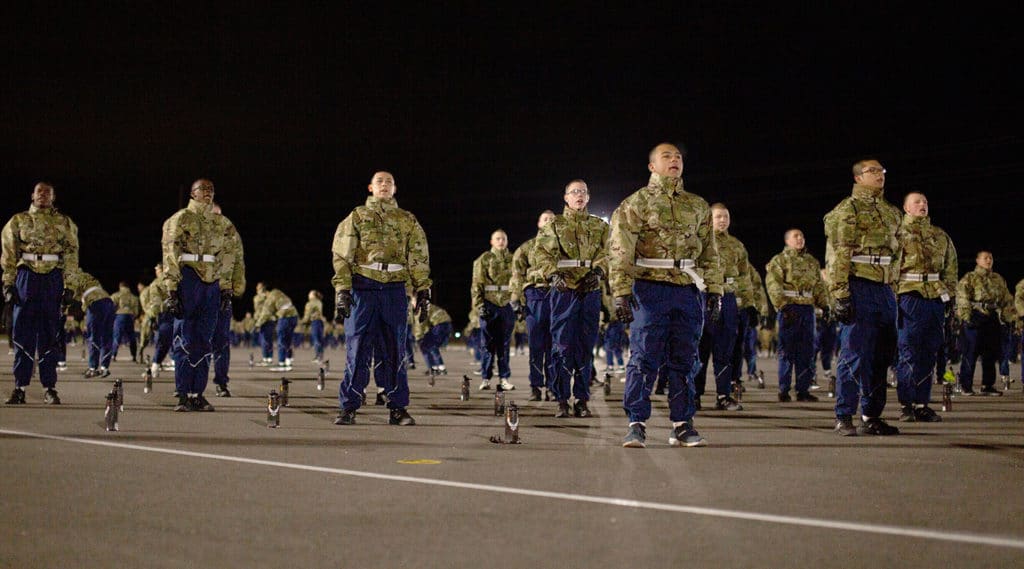
I’ve mentioned this before in a previous article, but the more physically prepared you can be before shipping off to BMT, the better you’ll set yourself up for success. Put another way, the easier it is for you during the PT workouts, the less stress you’ll feel about the final PT test in the 5th WOT. That’s Week of Training for you civilian types. While you’re preparing for BMT, keep in mind that the components of the test (1.5 mile run, pushups, and situps) are NOT the only physical exercises you’ll be doing in your daily workouts.
During most of your time at BMT, you’ll alternate between running workouts and more strength/calisthenics based workouts. If you want to get an idea of what you’ll be doing on both strength and aerobic days, be sure to download the Air Force’s DEP (Delayed Entry Program) app. Here you can find many of the EXACT PT routines you’ll follow in Basic.
Final note here- If you’ve gotten hyped up on a bunch of David Goggins videos, that’s all well and good but keep in mind that slow, steady progression is best. You should aim to increase your running mileage each week by no more than 10%. Any more than that and you significantly increase your chance of injury, particularly if you haven’t been physically active.
Meals and Sleep
For the most part, gone are the days of trainees only getting a couple minutes to cram food down their gullets and then getting chased out of the dining hall. For one, with all the stress that trainees are placed under while at Basic, it is imperative that they get the needed calories so that their bodies can recover. The Air Force has realized this and now trainees are supposed to get 10 minutes to eat to make sure they get all the nutrition they need.
No really, they get 10 minutes. Granted, this can still feel rushed if you’re used to taking your time, but it’s enough to eat a substantial meal. While I was at the 321st we had multiple digital clocks installed in the chow hall so that trainees could see how much time they had to eat and instructors could also see. It was communicated strongly from leadership that trainees be granted the full time to eat. I don’t know if all squadrons have the big clocks displayed, but if you and your flight aren’t being granted 10 minutes make sure you say something.
Bottom line, not getting enough to eat should NOT be a stressor in BMT.
Sleep is the other big factor for recovery. Most nights will be lights out at 2100 (that’s 9 p.m.) and wake up is at 0545. Do NOT stay up past lights out. If you don’t get recovery from adequate sleep that will definitely be an additional stressor on your mind and body and will make everything else that much harder. Some nights you WILL miss some sleep due to entry controller duty, so make sure to take advantage of sleep when you can.
Daily Physical Exertion
At BMT you are going to be on your feet constantly. Activities include practicing drill on the drill pad, marching to and from appointments, PT, details (cleaning up the dorm), etc. All of these burn calories. If you’re not used to being active or on your feet, you will get accustomed to it. It’s not that big a deal and it makes the time go faster. Another benefit is that when you are tired at the end of the day you will sleep well. This is a good kind of stress.
Social and Emotional Stress
Missing Home, Friends, Family
This is a common one. Even for those that tend to be more guarded or keep to themselves, don’t be surprised if you start to miss home or familiar faces. If you’ve never been away from home before, it’s more common. There are of course some things in place to alleviate this, such as the occasional phone call as well as sending and receiving mail.
If you should receive seriously distressing news from home, such as a death in the family or financial hardship, make sure to let your MTI know. Depending on what it is, they can authorize additional phone calls or work it through leadership to make sure you get the support you need.

No Time to Yourself
During your all expenses paid vacation stay at sunny Lackland AFB, you will be staying in the dorms with about 50 or so of your fellow trainees. If you’ve been to college or otherwise had roommates before, then this will seem a little more familiar to you. That experience will help, but there is a big difference between having 1 or 2 friends you chose to live with and staying with 50 strangers you have no previous connection with. Generally, I think most gender stereotypes are crap, but sometimes there is a bit of truth to them and that applies here to Basic.
The conventional wisdom is that males in a flight quickly start jockeying for position, arguing over who’s right, and if there is to be any conflict it shows up right away. This forces male flights to confront their differences early on, find a way to deal with them and then coalesce as a team. Female flights tend to hide their true feelings and attitudes behind masks for longer, just trying to keep the peace and get along. In the worst instances, feelings of irritation and resentment stew over time and while the flight may have been quick to use teamwork in the beginning, those feelings of resentment can bubble up to the surface in the later weeks causing the flight to become extremely dysfunctional.*
Being aware of these potential issues will help you spot them and better deal with them if and when they arise. You can also take solace in the fact that basic training is only so long and before you know it you’ll be moving on to the next phase of your career.
*Just before I retired, BMT introduced the concept of integrated flights, so you’d have your main flight which was a mix of male and female trainees and then your dorm flight, which would obviously all be the same gender. Sound confusing? Yeah. However, there is some logic to this as outside of basic training most units/teams are mixed gender.
Introduction to Differing Worldviews
I mentioned earlier that you will room with a bunch of strangers in the dorms at BMT. Over time you’ll get to know these individuals, and they won’t be strangers anymore. Depending on your own background, you may encounter ideas and beliefs that might be new to you. Everyone you meet will have their own set of experiences, talents, values, and ways of approaching problems. You might meet someone who actually grew up in another country or who speaks English as their second language. You’ll meet some who are from rural areas that have never met someone that doesn’t look or think like them.
While you might be initially shocked to find out some people have a different point of view than you, I urge you to be open to it, as long as it is not hurting someone. When I say open to it, I don’t mean that you need to adopt their views, but simply that being part of the Air Force means being part of a team. A team is strongest when it’s comprised of people who can approach things from different angles.
In the rare case that someone displays rhetoric that approaches hate speech or sexual harassment, then yes YOU NEED TO SAY SOMETHING. These kinds of views and language are incompatible with service in the USAF. You can speak either directly to your instructor or anonymously on a comment card. These are available throughout BMT.
Gettin’ Your Feelings Hurt
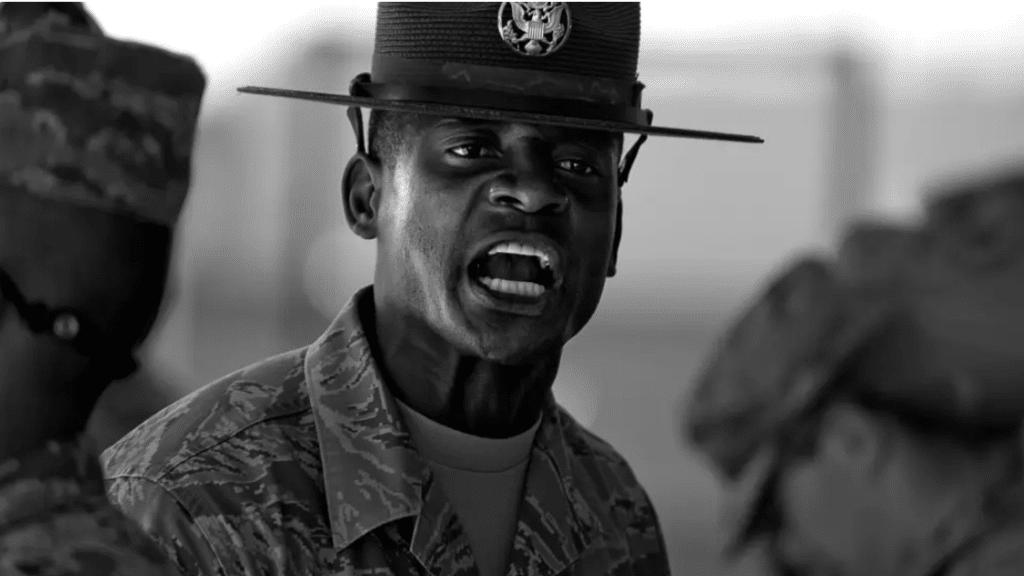
Getting yelled at is probably the one thing most prospective trainees associate with basic training more than anything else. It’s true. You’ll be yelled at early and often. There are various reasons for this. BMT is a loud and chaotic environment. Sometimes the instructor just needs to be heard above the din. Other times, they might be giving a trainee the business so that the rest of the flight can also learn from their mistake. Or maybe that trainee is clearly not taking things seriously and they need this intensity of correction.
No matter what, you’re not going to avoid this, but it does help to know a couple things. One, your instructor doesn’t hate you and they don’t think you suck just for being there. It’s their job to correct you and train you. Sometimes that includes yelling. But ultimately, they want to see you succeed. Two, yelling isn’t the end all, be all. After a while, yelling isn’t as effective. Instructors have other tools with which to shape flights, so rest assured, it won’t always be the same.
This is one area where a person’s personality and background will play a big part in how much the yelling and intensity of the instructors gets to them. If you played sports or were part of an ROTC program maybe you’re used to getting yelled at. But if you were somewhat sheltered growing up just be prepared for that initial shock of the first few days. On the other hand, if you are used to getting away with everything and no parent or teacher has ever really held you accountable, well….that’s going to change.
Mental Stress
No matter what your strengths or experience are, basic training is going to challenge you mentally. Often, this takes the form of “drinking through a firehose”. You’ve probably heard this phrase before. What it means in the context of BMT is that there is going to be so much information coming at you, it is going to be difficult to sort through it all, let alone remember it. This becomes even more difficult when you’re tired or when you’re distracted due to other stresses.
Studying
Near the end of training you will take the EOC, or end of course exam. This will test your overall knowledge of the Air Force, with 100 random questions pulled from the study guide you’ll have access to. If you haven’t done all that well in school, or if you regularly get tied up in knots over a big test then this could be a challenge for you. This is a long-term stressor, one that can loom over you the whole time at Basic, if you let it. However, this is also something that you have a lot of control over, so if you take the necessary steps you’ll be able to pass.
Drill
In addition to studying Air Force related information, you will learn various drill movements. Some trainees, especially guidon bearers (those holding the staff), get nervous with drill because it is performance based. You don’t get to take your time here. When the MTI calls the command you have to react in time. If you don’t understand the movement it’s going to become apparent really quickly (and you’re going to hear about it).
Learning Procedures
Some events in BMT you will only do ONCE, so you need to be on your “A” game to get it right the first time. Your MTI will rarely waste time telling you things that aren’t important, so make a mental note to always pay attention when they’re giving you information. If it’s a set of instructions, you can bet that they will notice if you get them wrong!
There are procedures for everything and some you will practice multiple times a day. These include chow hall procedures and entry controller procedures. Sometimes, especially in the beginning of training, these situations can be INTENSE. In other words they can be loud and chaotic, especially if you are making a lot of mistakes.
Here’s the secret though, to all of the above mentally stressful scenarios- YOU ARE GOING TO MAKE MISTAKES. There are just too many things happening and too many things to be aware of for it not to happen. That isn’t to discourage you, but to let you know that you’ll need to let go of the idea that you can be the perfect trainee if you just try hard enough. Don’t get me wrong. You NEED to try your best and give your all, 100% of the time.
Just realize that as you strive for perfection, even if you fall short along the way, if you continue giving your best effort you will make progress in all of these areas and transform into the person you need to be in order to be successful in your Air Force career.
Conclusion
Like I mentioned earlier, how hard Air Force Basic Training is, is a matter of perspective. Most likely, you’ll encounter some form of kryptonite, whether that’s a lack of attention to detail, running for long periods, or missing home. If you commit to entering training with the right mindset and a willingness to help your wingmen (as well as a willingness to accept help) you’ll be well on your way to success. Although there are many factors that combine to make Air Force BMT a potentially stressful experience, the result is a net positive, meaning that you will be a stronger, more competent person for having gone through training. I wish you luck!
For some additional thoughts on how to prepare for Air Force Basic Training, see THIS ARTICLE
